Click here and press the right key for the next slide.
(This may not work on mobile or ipad. You can try using chrome or firefox, but even that may fail. Sorry.)
also ...
Press the left key to go backwards (or swipe right)
Press n to toggle whether notes are shown (or add '?notes' to the url before the #)
Press m or double tap to slide thumbnails (menu)
Press ? at any time to show the keyboard shortcuts
The National Student Survey
You can access the NSS at www.thestudentsurvey.com and fill in the survey following a few simple steps. You will also be sent a personalised link by Ipsos MORI later this week.
Louis B
Why do you suggest that moral convictions and the emotions they evoke shape political attitudes when to my understanding this claim suggests moral convictions evoke emotions, which a large part of the 1st part of the course could be considered to argue against?
This is on the assumption that by conviction you might mean belief. I did look for a definition in amongst week 4/5 glossaries but could not find it.
‘Moral convictions and the emotions they evoke shape political attitudes’ (Feinberg & Willer, 2013, p. 1).
‘Moral conviction refers to a strong and absolute belief that something is right or wrong, moral or immoral’ (Skitka et al., 2005, p. 896).
‘Moral conviction was assessed with a single-item measure, specifically, “How much are your feelings about ______ connected to your core moral beliefs or convictions?”
(Skitka et al., 2005, p. 899).
A moral conviction is whatever your participants think it is.
Louis B
Why do you suggest that moral convictions and the emotions they evoke shape political attitudes when to my understanding this claim suggests moral convictions evoke emotions, which a large part of the 1st part of the course could be considered to argue against?
This is on the assumption that by conviction you might mean belief. I did look for a definition in amongst week 4/5 glossaries but could not find it.
Does moral conviction evoke emotion?
conviction -> emotion
Pt 1: Does emotion influence moral judgement?
emotion -> judgement
Louis B
Why do you suggest that moral convictions and the emotions they evoke shape political attitudes when to my understanding this claim suggests moral convictions evoke emotions, which a large part of the 1st part of the course could be considered to argue against?
This is on the assumption that by conviction you might mean belief. I did look for a definition in amongst week 4/5 glossaries but could not find it.
Anna B
Could you explain in a bit more depth what fluency is?
fluent speaking vs fluent thinking
metacognitive feelings
... of familiarity
... of it being on the tip of your tongue
... of someone’s eyes are boring into your back
... of agency (that was me)
... of being right
Thompson et al. (2013, p. Experiment 1a) asked people to give a fast answer, a confidence judgement, and then take as much time as they like to give a final answer.
[rough results] Faster answers -> stronger feeling of being right -> less thinking subsequently
Fluency and surprise
‘the intensity of felt surprise is not only influenced by the unexpectedness of the surprising event, but also by the degree of the event's interference with ongoing mental activity’ (Reisenzein, 2000, p. 271)
Anna B
Could you explain in a bit more depth what fluency is?
Louis B
You made the claim that there are at least two fundamental domains of morality (harm and purity) and that these are not reducible to one another.
Surely the evidence from Van Leeuwen et al., where the historical prevalence of pathogens significantly 'predicted endorsement of [...] Purity/sanctity'
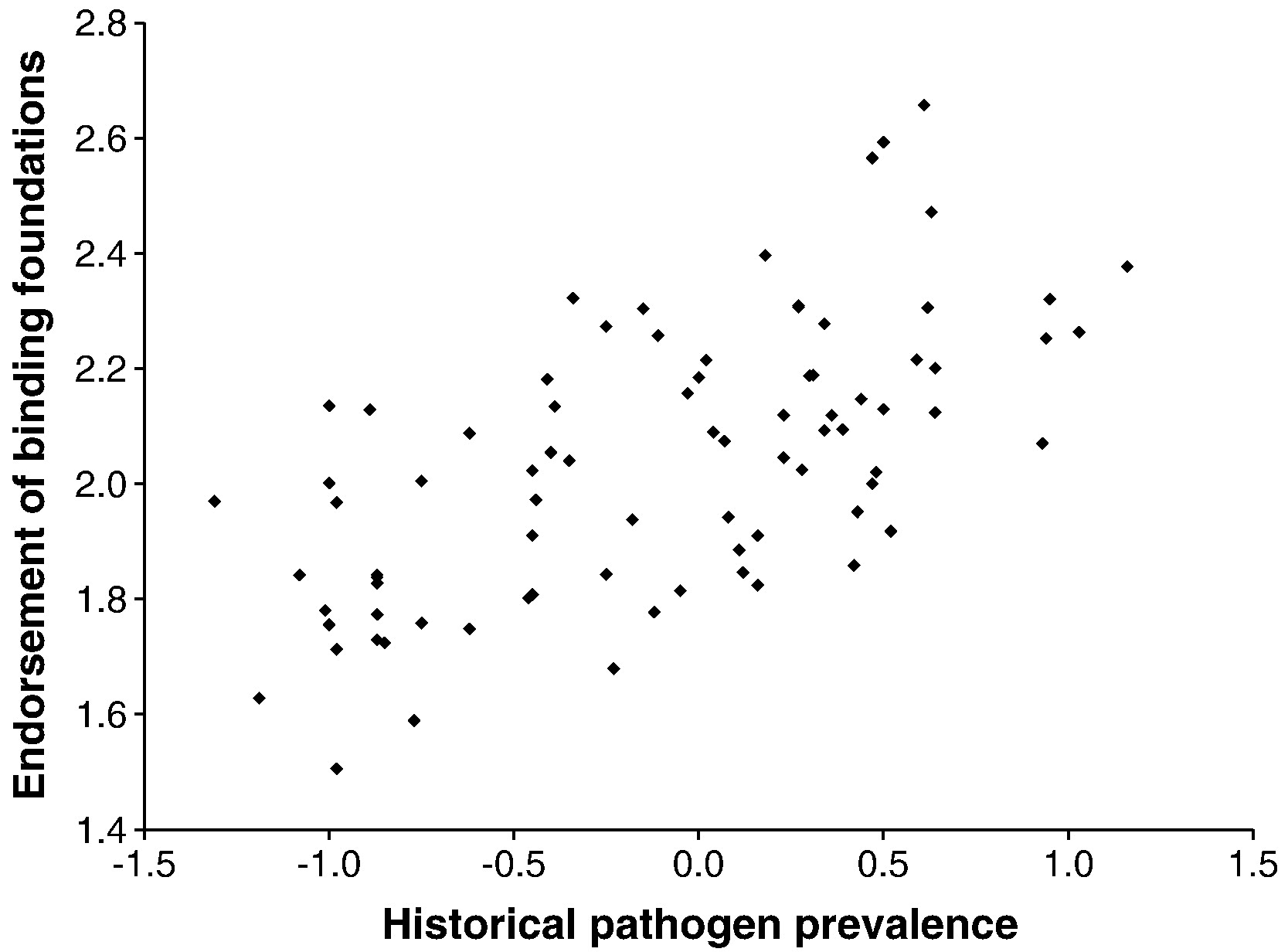
van Leeuwen et al, 2012 figure 1
Louis B
You made the claim that there are at least two fundamental domains of morality (harm and purity) and that these are not reducible to one another.
Surely the evidence from Van Leeuwen et al., where the historical prevalence of pathogens significantly 'predicted endorsement of [...] Purity/sanctity'
- (which you go on to say fits in well with the idea that cultures in specific areas adapted with this knowledge to avoid pathogens, which is ultimately a great personal harm, as well as a social one) -
could plausibly be reduced to the domain of survival, of which the moral foundation of harm/bodily harm is also part.
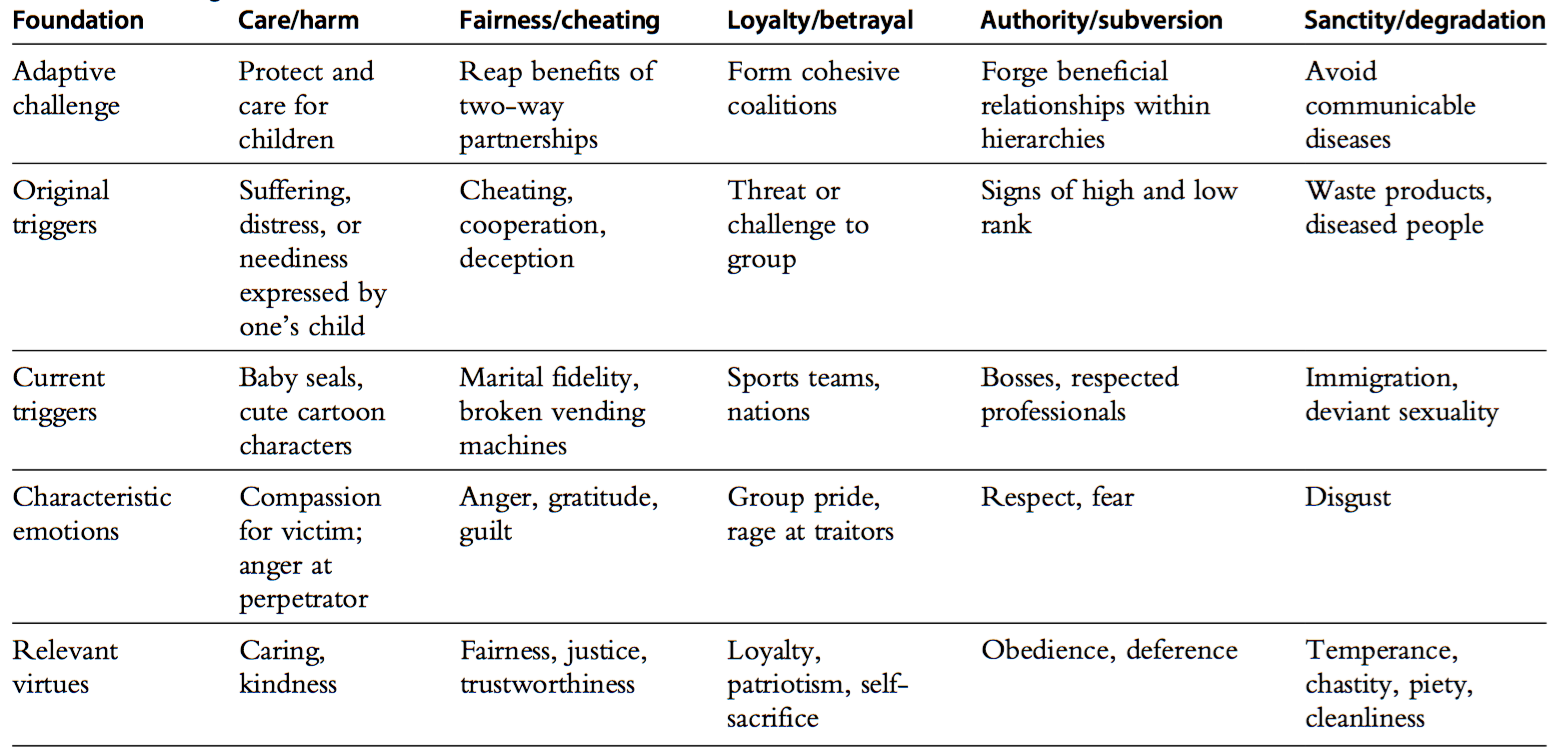
Graham et al, 2013 table 2.1
theorists’ perspective vs subjects’ perspective
meta perspective: if we have a domain of moral concern now because of its adaptive value in the past, should we re-evaluate?
Louis B
You made the claim that there are at least two fundamental domains of morality (harm and purity) and that these are not reducible to one another.
Surely the evidence from Van Leeuwen et al., where the historical prevalence of pathogens significantly 'predicted endorsement of [...] Purity/sanctity'
- (which you go on to say fits in well with the idea that cultures in specific areas adapted with this knowledge to avoid pathogens, which is ultimately a great personal harm, as well as a social one) -
could plausibly be reduced to the domain of survival, of which the moral foundation of harm/bodily harm is also part.
Sziszi
a question concerning the next essay title.
To what extent should we give emphasis on 'the feasibility of democratically mitigating climate change'?
I am a bit confused here because this is a very political part of the question and there are different approaches to the meaning of 1) 'feasibility and' 2) 'democratic'.
As I understand - and because it is a Moral Psychology module - we should discuss and focus more on what Moral Psychology can offer so far.
Sziszi
However, as there are severalapproaches to the second part of the question, should we try to definewhat feasibility (or democratic) means in the 500 words or it should not necessarily be the focus of the essay?
Democratic: changing people’s minds rather than relying on force.
Feasibility: obstacles can be removed.
Sziszi
Special issue of Social Cognition links to moral psychology
https://guilfordjournals.com/toc/soco/39/1
Louis B
Could it be said that liberals and conservatives have differing moral perspectives' whereby one is focused on binding 'social group' needs and the other on individual needs.
This appears to me to sort out the Joan-Lars-Joseph objection at the very least, as this does not claim individual needs and 'social group' needs to be of equal value.
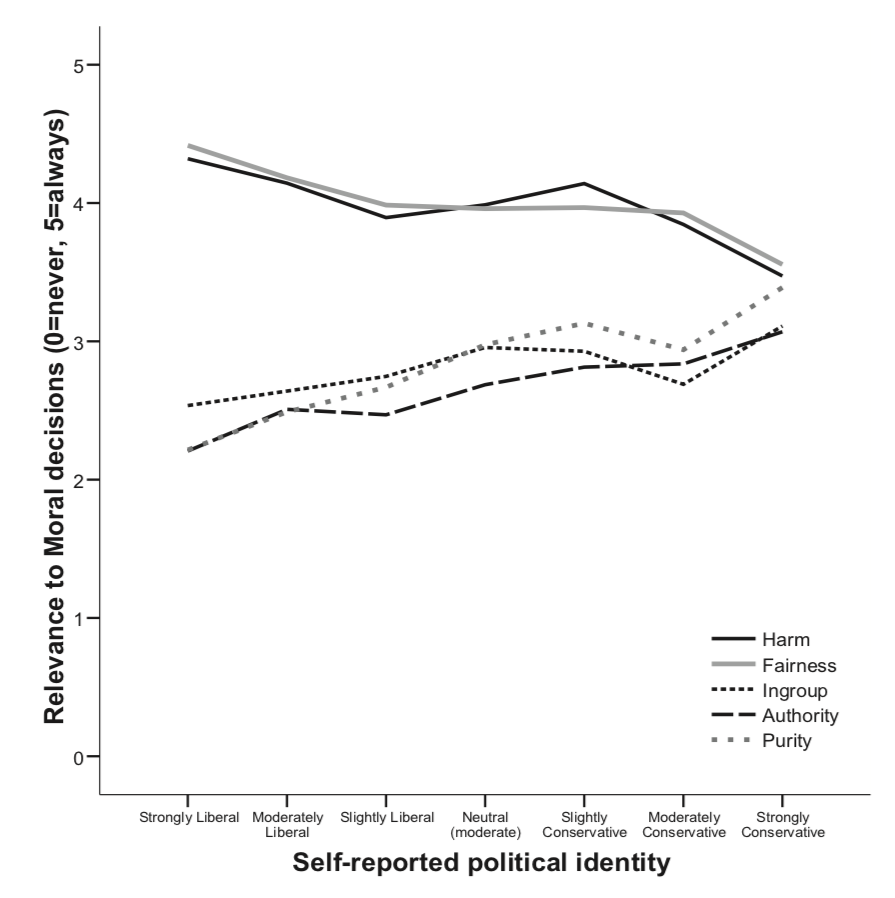
Graham et al, 2009 figure 1
The Joan-Lars-Joseph objection
The evidence on cultural variation says socially conservative participants tend to regard all five foundations as roughly equally morally relevant.
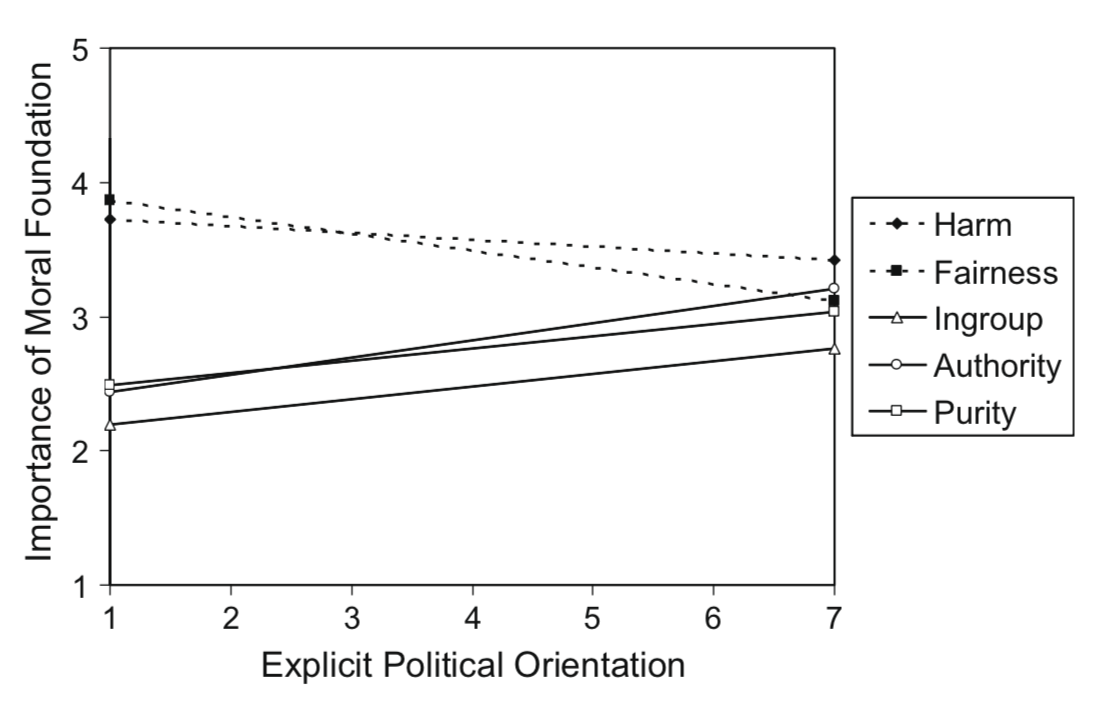
van Leeuwen & Parks, 2009 figure 1a
Louis B
Could it be said that liberals and conservatives have differing moral perspectives' whereby one is focused on binding 'social group' needs and the other on individual needs.
This appears to me to sort out the Joan-Lars-Joseph objection at the very least, as this does not claim individual needs and 'social group' needs to be of equal value.
Anya
On Feinberg & Willer (2013)
the framing of moral appeals greatly influences one's pro-environmental attitude
when they reframe this issue in terms of purity, this produces greater appeal towards conservatives and their concern levels increase,
however I do not understand why the liberal levels do not significantly decrease?
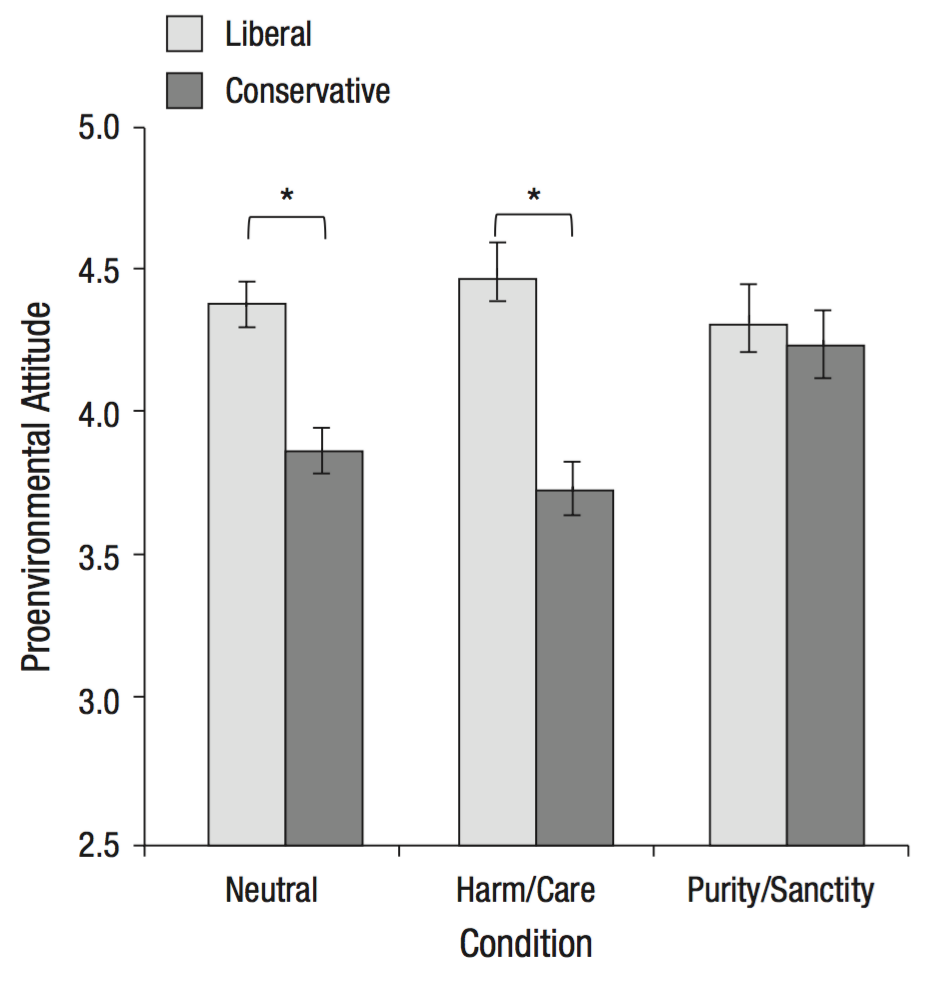
Feinberg & Willer, 2013 figure 2
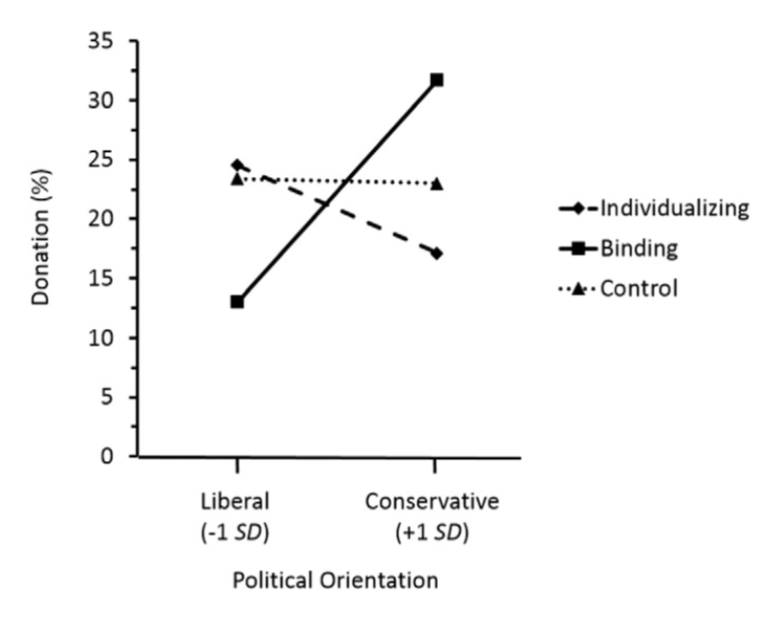
Wolsko et al. (2016, p. figure 5)
Anya
On Feinberg & Willer (2013)
the framing of moral appeals greatly influences one's pro-environmental attitude
when they reframe this issue in terms of purity, this produces greater appeal towards conservatives and their concern levels increase,
however I do not understand why the liberal levels do not significantly decrease?
Questions?
The National Student Survey
You can access the NSS at www.thestudentsurvey.com and fill in the survey following a few simple steps. You will also be sent a personalised link by Ipsos MORI later this week.
